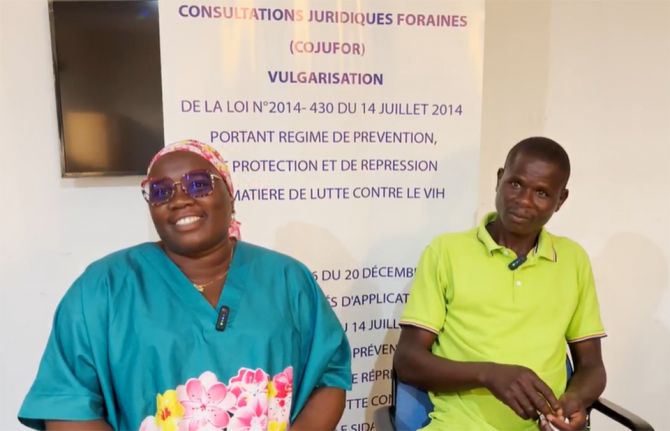
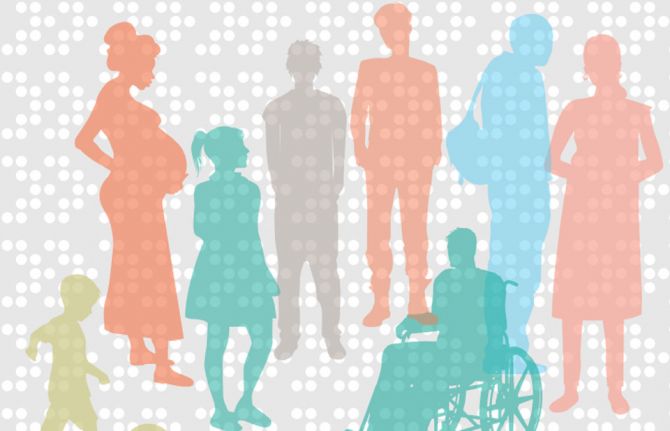
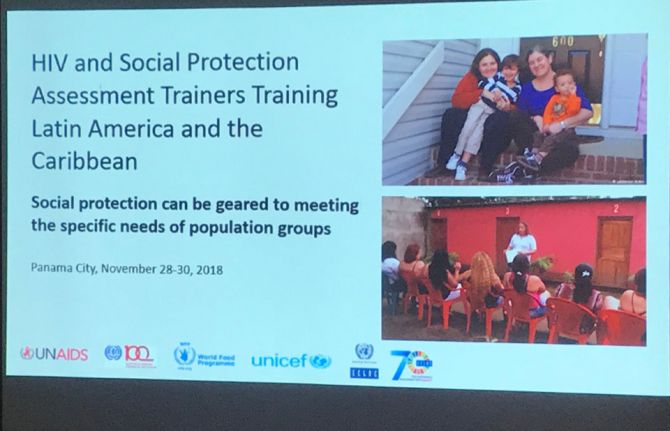
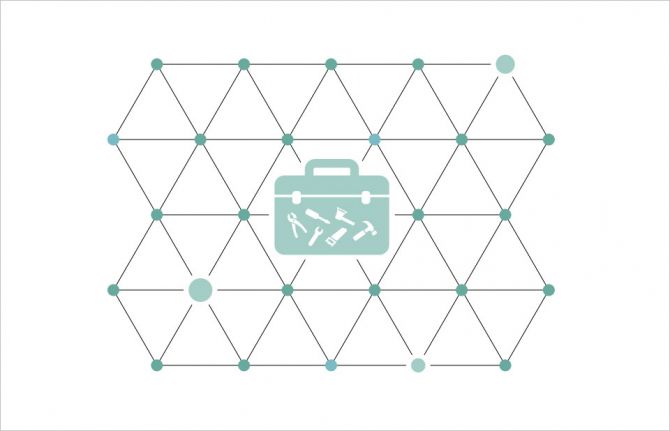
Update
Training trainers on HIV and social protection
29 November 2018
29 November 2018 29 November 2018To better support countries in Latin America and the Caribbean to Fast-Track their HIV and social protection programmes, UNAIDS and partners are training senior government and civil society representatives, including people living with HIV, from 14 countries in the region on the HIV and Social Protection Assessment Tool.
The training will train trainers, who will in turn train national stakeholders to undertake HIV and social protection assessments. Those HIV and social protection assessments will generate information that will assist countries to improve their ability to connect the AIDS response to social protection programmes and other programmes for alleviating poverty and exclusion.
In the Latin America and Caribbean region, HIV continues to seriously affect key populations, including transgender people and gay men and other men who have sex with men. The epidemic in the region is exacerbated by stigma and discrimination, unemployment, gender-based violence, limited access to quality education, health and social services, food insecurity and poverty. HIV-sensitive social protection helps to address stigma and discrimination and meet the multiple needs of people living with and affected by HIV in order to enhance their ability to access HIV and health services.
All 14 countries in the Latin America and Caribbean region reviewed in a 2018 rapid assessment of the status of HIV-sensitive social protection commissioned by UNAIDS have a social protection scheme that includes vulnerable people. However, only Argentina, Brazil, Guatemala and Peru explicitly include key populations.
The training of trainers is taking place in Panama from 28 to 30 November.
Quotes
“We must strengthen the functioning of social protection programmes to better reach everyone, including key populations.”
“We must build the capacity of civil society and individuals to claim their rights to social protection and hold duty-bearers accountable for providing quality services.”
“To retain the integrity of social protection as a state responsibility towards all people, we must base social protection benefits in national statutes and laws.”
What UNAIDS is doing on
Region/country
Related

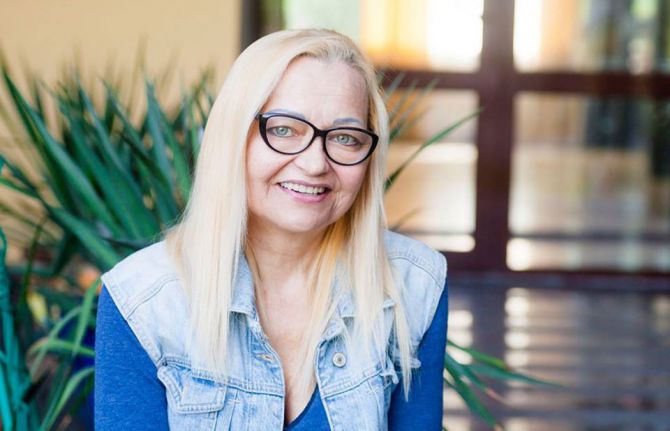
Update
Remembering AIDS activist Iryna Borushek
26 November 2018
26 November 2018 26 November 2018Iryna Borushek recently passed away in Kyiv, Ukraine, after a long illness. With her passing, the international AIDS community has lost one of the strongest and most dedicated activists and leaders.
One of the highlights of my career in the AIDS response and my work with UNAIDS has been the honour to know and work with Ms Borushek.
For the past 20 years, she was one of the most articulate and passionate civil society activists, advancing the national AIDS response in Ukraine and inspiring AIDS responses across eastern Europe and central Asia.
Beginning in the late 1990s, Ms Borushek was one of the earliest activists who defended the rights of people living with HIV at a time when an HIV-positive diagnosis was tantamount to a death sentence. People living with HIV were just beginning to learn about access to treatment, and Ms Borushek was among only a few people in the region who openly disclosed their HIV status.
For Ms Borushek and other early activists, those years were very challenging. It required incredible bravery, faith in one’s strength and a fierce optimism that speaking up and acting up will save lives and change the future. Ms Borushek had all of those qualities and thankfully she demanded all of us to demonstrate at least some of those same qualities every day.
In 2001, she helped to found the All-Ukrainian Network of People Living with HIV. Thanks to her tireless energy and commitment to community activism, the All-Ukrainian Network of People Living with HIV is now one of the most powerful civil society organizations, not only in Ukraine, but globally.
Throughout her career she continued her studies, first at the Odesa University of Economics, then at the Socium School, as well as through study opportunities and internships in Poland, Germany and the United States of America on how to implement evidence-informed programmes for substitution therapy, health systems strengthening and support for people living with HIV, in particularly for injecting drug users.
Ms Borushek was recognized as one of the brightest activists in this new area, uniting civil society leadership with governance and the urgent, life-saving scale-up of antiretroviral therapy.
Ms Borushek quickly became an international symbol of Ukraine’s bold HIV activism. Together with Vladimir Zhovtyak, she participated in the first United Nations General Assembly Special Session on HIV/AIDS, in June 2001. In subsequent years, she took a leadership role in many international AIDS forums. As a member of the eastern Europe and central Asia delegation to the board of the Global Fund to Fight AIDS, Tuberculosis and Malaria from 2004 to 2009, she supported and advocated for the Global Fund’s first grants to eastern Europe and central Asia.
Ms Borushek’s professional focus was devoted to the establishment of a new, people-centred strategy on HIV in Ukraine, the roll-out of national programmes for antiretroviral therapy and substitution therapy and HIV care and support programmes implemented by the All-Ukrainian Network of People Living with HIV and its partners in Ukraine. Every day, Ms Borushek insisted that people living with HIV should not only be fully represented in the decision-making process, but also be engaged in the implementation of programmes and services.
In 2007, she was presented with an award for leadership, partnership and commitment to the national response to HIV in Ukraine. In 2007, Ms Borushek also received an award for international women’s leadership in the response to HIV at the International Women's Summit in Nairobi, Kenya.
I will always remember as her as one of the most passionate activists who always found the time to be a precious friend. Her vision and energy continue to live on in her daughter and granddaughter, in her friends and colleagues across the world and, of course, in the principles and programmes to which she dedicated her life.
Ms Borushek’s funeral took place on 26 November in Kyiv. Words of support for loved ones and condolences can be sent to the All-Ukrainian Network of People Living with HIV.
By Vinay P. Saldana
Director, UNAIDS Regional Support Team for Eastern Europe and Central Asia
Region/country
Related


Update
Yekaterinburg to be the first Russian city to sign the Paris Declaration
20 November 2018
20 November 2018 20 November 2018The Mayor of Yekaterinburg, Alexander Vysokinsky, has announced that Yekaterinburg will become the first city in the Russian Federation to sign the Paris Declaration to end the AIDS epidemic.
In signing the Paris Declaration, Yekaterinburg will commit to putting the city on the Fast-Track to ending the AIDS epidemic through reaching the 90–90–90 targets, whereby, by 2020, 90% of people living with HIV will know their HIV status, 90% of people who know their HIV-positive status will be accessing treatment and 90% of people on treatment will have suppressed viral loads.
According to government statistics, more than 22 000 people are living with HIV in Yekaterinburg.
In announcing the decision to sign the Paris Declaration, Mr Vysokinsky noted that the initiative will encourage innovations and cutting-edge treatment programmes to address HIV and other health challenges and will contribute to a better life for future generations.
Since the launch of the Fast-Track cities initiative on 1 December 2014, about 300 cities and municipalities around the world have signed the Paris Declaration. Leaders in those cities have recognized that their strategies for responding to the AIDS epidemic also offer them a platform to address the need for social inclusion, public services, primary health care and community mobilization.
Quotes
“AIDS is a challenge that needs to be addresses in any large city. In Yekaterinburg, we are talking about HIV, we are taking concrete steps and as a Fast-Track city we are committed to reach the 90–90–90 targets by 2020.”
“UNAIDS welcomes the decision of Yekaterinburg to join the Paris Declaration and to achieve a breakthrough in the city’s response to HIV. We hope that Yekaterinburg will be the first of many cities in the Russian Federation to join this initiative, which can help to change the trajectory of HIV infections in a country.”
Region/country
Related

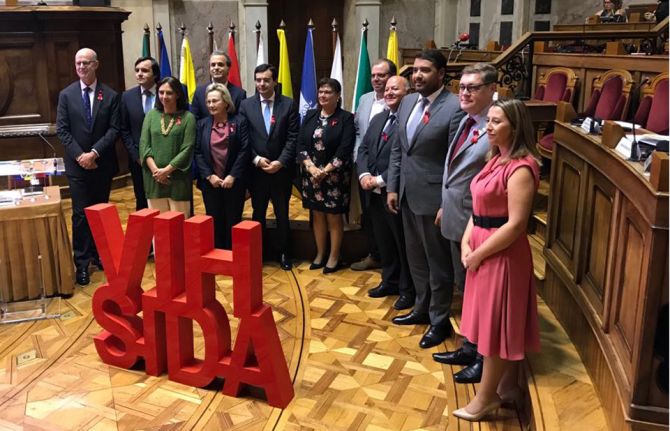
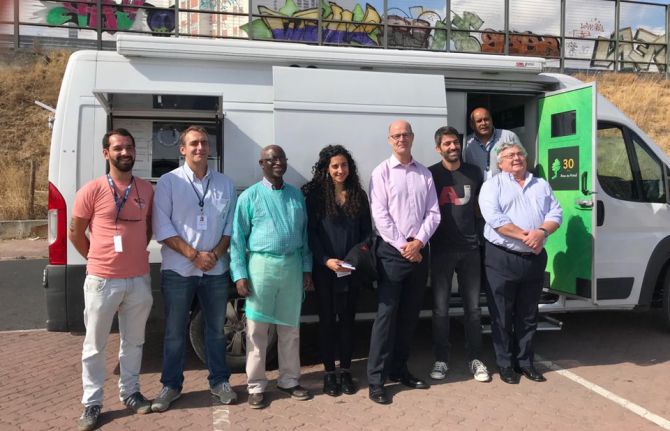
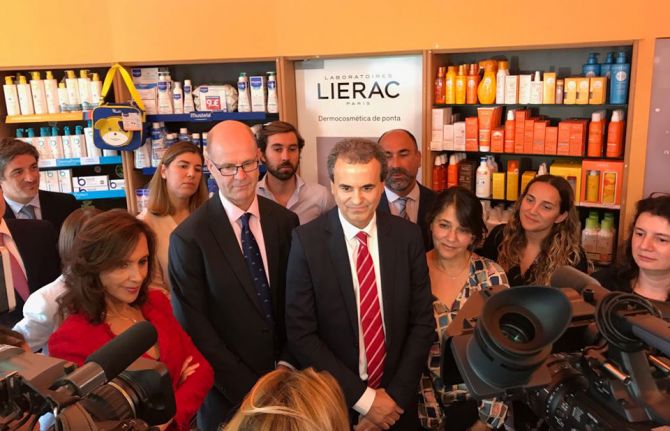
Update
More Portuguese cities commit to the Fast-Track
12 October 2018
12 October 2018 12 October 2018On 10 October, the mayors of the Portuguese cities of Almada, Amadora, Loures, Odivelas, Oeiras, Portimão and Sintra signed the Paris Declaration to end the AIDS epidemic in cities. Joining Cascais, Lisbon and Oporto, 10 Portuguese cities have now signed the declaration. In signing the Paris Declaration, mayors commit to putting their cities on the Fast-Track to ending the AIDS epidemic.
Portugal has been a pioneer in the AIDS response since the outset of the epidemic, creating enabling legal environments, enacting progressive drug policies and making HIV treatment free for all, regardless of their migration status. Portugal continues to lead today, driving community-based care models and promoting better integration of health-care services.
During a site visit in Cascais, Portugal, Tim Martineau, UNAIDS Deputy Executive Director, a.i., saw the nationwide launch of an initiative that aims to bring HIV services closer to the people who need them: HIV testing in community pharmacies. This initiative was integrated into the Cascais Fast-Track City Strategy. Self-testing is set to become available later this year, since the necessary legislation was just approved by the Portuguese Government
During his trip to Portugal, Mr Martineau also visited the Mobile Outreach Program of Aires do Pinhal – Association for Social Inclusion. With the support of the Ministry of Health, since 1986 the programme has provided harm reduction and social support services to people who inject drugs, giving access to services to about 1200 people daily. Services—including screening and treatment for HIV, hepatitis C, tuberculosis and syphilis, as well as methadone delivery, syringe exchange and distribution of condoms—are provided free from discrimination to people regardless of their nationality, including undocumented migrants.
The signing ceremony for the Paris Declaration was held at the Pálacio de São Bento in Lisbon, Portugal, and was attended by the Director-General of Health, Graça Freitas, Mr Martineau and representatives of civil society. In his closing speech, the Secretary of State, Fernando Araújo, expressed his hope that Portugal would continue to show leadership in the Fast-Track response to HIV.
Region/country

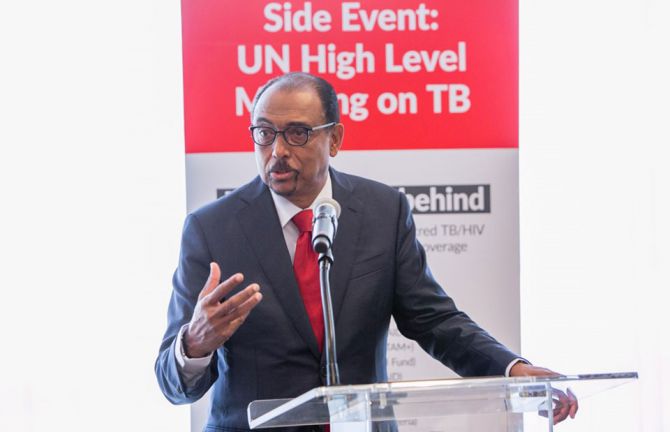
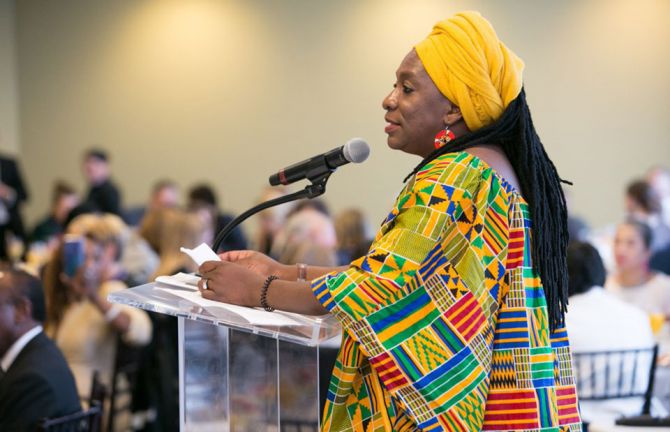


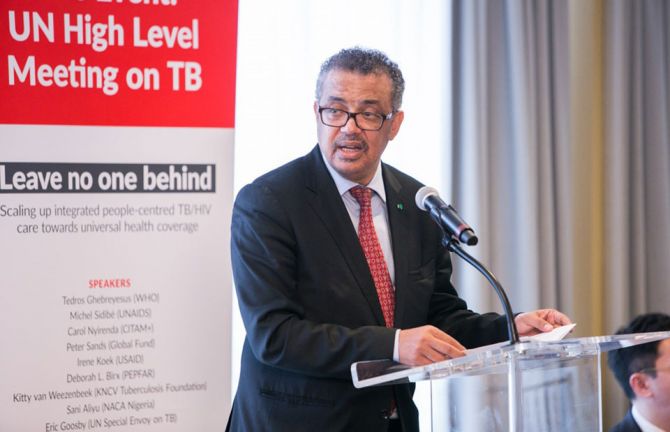
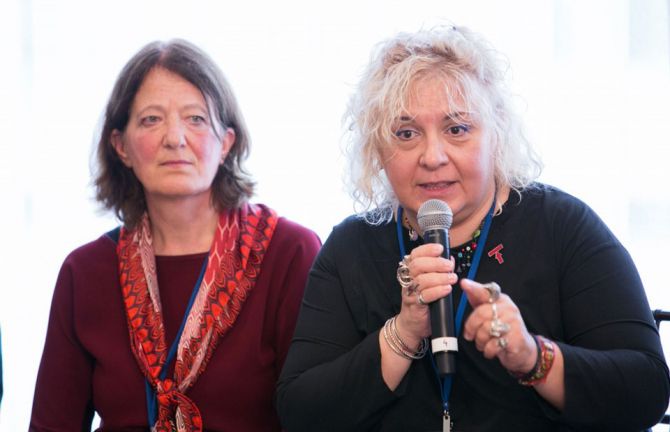
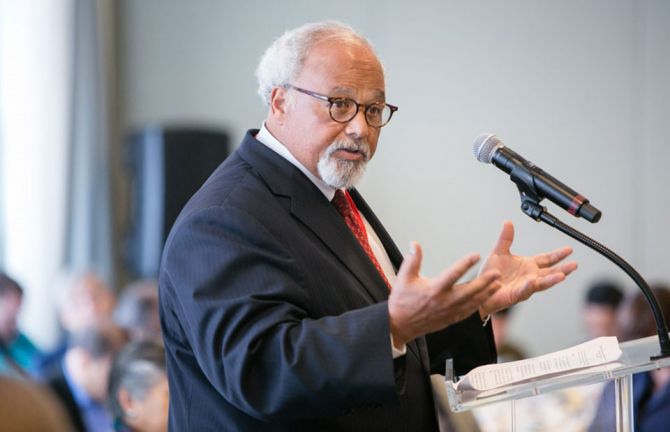
Update
The need to scale up integrated TB/HIV care
26 September 2018
26 September 2018 26 September 2018Global leaders met for the first United Nations High-Level Meeting on Tuberculosis on 26 September. The meeting was a critical moment to drive the delivery of political commitments and ensure a people-centred and coordinated tuberculosis (TB)/HIV response.
In the morning before the opening of the high-level meeting, affected communities, ministers of health, representatives of the United Nations, TB/HIV programme implementers and technical experts came together at a side event entitled No One Left Behind: Scaling Up Integrated People-Centred TB/HIV Care Towards Universal Health Coverage. The event provided a space to discuss the current challenges, gaps and opportunities in serving people and communities affected by TB/HIV and how each stakeholder has a unique opportunity to commit to increase the effort, overcome the barriers and scale up programmes and policies that work.
Approximately 10 million people fell ill with TB in 2017. The World Health Organization estimates that nearly a quarter of the world’s population has a latent TB infection. TB is the leading cause of death among people living with HIV, causing around a third of all AIDS-related deaths. While TB programmes generally have a very high HIV testing rate, HIV programmes are not testing, preventing and treating TB nearly enough.
The panel of practitioners and people affected by TB/HIV discussed what it takes to build an effective and sustained TB/HIV approach that delivers quality integrated care built on a strong community response. Speakers called for the response to be adequately funded and rights-based and firmly anchored in the universal health coverage agenda and the 2030 Agenda for Sustainable Development.
The speakers reiterated the critical importance of involving the users of health services in planning and implementing those services and staying accountable to the communities that are at the heart of the service delivery. They called for a break in the one client–two clinics model that has been the history of TB/HIV care in the past and agreed on the importance of people-centred care and both a funding environment and a government position that encourages local access and joint programming.
Quotes
“Tuberculosis has no boundaries. Tuberculosis and HIV have affected and killed millions in the world. We cannot continue to do business as usual. We call on our governments to take a leading role in funding the response. Donors and national governments need to step up.”
“Tuberculosis is not just a technical problem, it is a truly political issue. It is an issue of poverty, of people who have not been exposed to information and who have been left behind. We need to learn from what we did in the AIDS response and apply it to the response to tuberculosis. We cannot talk about achieving the Sustainable Development Goals if we continue to work in silos.”
“One client–two clinics: this mould has to be broken. We need to change the clinics to be youth-friendly, men-friendly and friendly for women who are not pregnant—to get people into the clinics. We can’t have just words, the client has to be at the centre. Every minister of health needs to go back from this meeting and make their tuberculosis and HIV people work together.”
“Why are so many people living with HIV dying from tuberculosis? The people most in need are the ones who are the ones who are left behind. We need new and improved medicines and diagnostics, new service delivery models based around what people and communities need, and integrated services for tuberculosis/HIV and other health issues.”
“The people who have the most at stake are the ones who use the services. For governments not to understand that is a tragic mistake. We need to change the systems to the changing needs of people and create a more comprehensive and sustainable package of medical care for people. There is light at the end of the tunnel, but it’s a long tunnel.”
Related

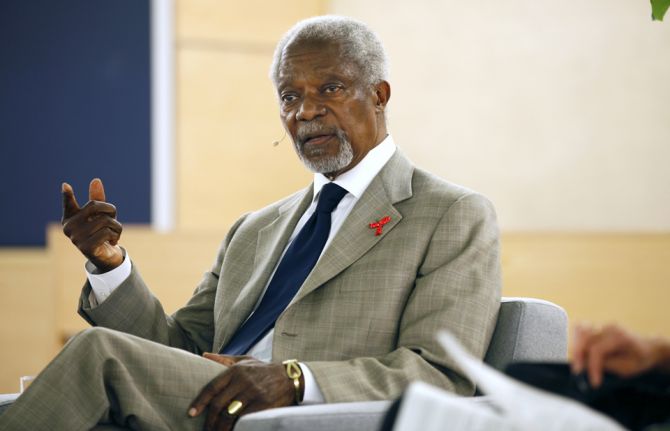
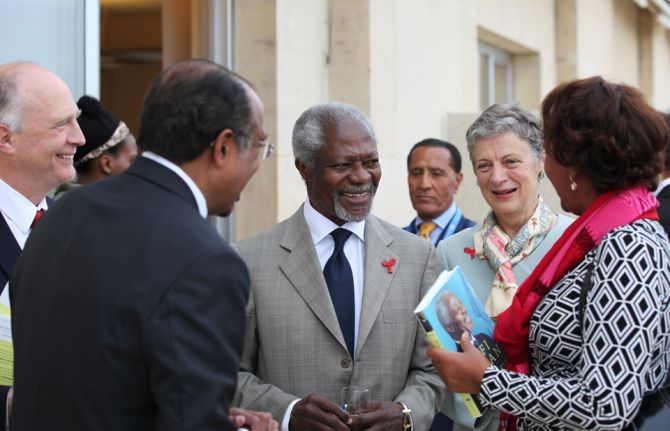

Update
Kofi Annan’s AIDS legacy
20 August 2018
20 August 2018 20 August 2018By UNAIDS Executive Director Michel Sidibé
A shining light of Africa has passed away. An African at heart, but a global citizen, Kofi Annan symbolized the best of humanity. He was a rabble-rouser, a troubleshooter and a change-maker.
At the turn of the century, AIDS denialism was at its peak. Mr Annan helped to break it. “More people have died of AIDS in the past year in Africa than in all the wars on the continent. AIDS is a major crisis for the continent, governments have got to do something. We must end the conspiracy of silence, the shame over this issue,” he said.
When Mr Annan began his term as the new United Nations Secretary-General in 1997, the outlook for the AIDS epidemic was bleak—some 23.3 million people were living with HIV, there were 3.2 million new HIV infections and access to life-saving treatment was only available to a privileged few.
He cajoled world leaders, humbly, diplomatically, and when the message did not sink in he spoke out publicly and forcefully. “Friends, we know what it takes to turn the tide against this epidemic. It requires every president and prime minister, every parliamentarian and politician, to decide and declare that 'AIDS stops with me. AIDS stops with me,'” he said.
Under his leadership, in 2000 the United Nations Security Council adopted resolution 1308, identifying AIDS as a threat to global security. In 2001, the United Nations General Assembly Special Session on HIV/AIDS was held—the first-ever meeting of world leaders on a health issue at the United Nations.
In 2000, at a time when less than US$ 1 billion was being invested in the AIDS response, he called for a war chest of at least US$ 7–10 billion for AIDS, tuberculosis and malaria. That call, and his concerted lobbying of world leaders, led to the creation of the Global Fund to Fight AIDS, Tuberculosis and Malaria, which went on to save millions of lives. Mr Annan remained a patron of the Global Fund, helping to ensure that it is fully funded.
The Millennium Development Goal of halting and reversing the spread of AIDS and the 2001 United Nations Declaration of Commitment on HIV/AIDS set HIV prevention targets, but did not set concrete targets for access to treatment. At the time, the cost of antiretroviral medicines was astronomically high. Sitting down with the pharmaceutical industry, Mr Annan helped to pave the way for an eventual reduction in their prices. Who could have believed in 2001 that the cost of life-saving antiretroviral medicines would fall by 2018 to as low as US$ 60 per person per year. Today, some 21 million people are on HIV treatment.
Mr Annan deftly used his convening power for good. When he learned that less than 30% of people had knowledge of HIV, he brought together media leaders and helped to launch the Global Media AIDS Initiative. As a result, hundreds of hours of AIDS awareness programmes were run pro bono by public and private media companies around the world. Mr Annan even appeared with an HIV-positive Sesame Street character, helping to reduce stigma and discrimination against children affected by HIV.
His heart was with people affected by HIV. He saw first-hand the realities of the HIV epidemic. He knew that real change came when women and girls were empowered. “It requires real, positive change that will give more power and confidence to women and girls and transform relations between women and men at all levels of society,” he said. “It requires greater resources for women, better laws for women and more seats for women at the decision-making table. It requires all of you to make the fight against AIDS your personal priority not only this session, or this year, or next year, but every year until the epidemic is reversed.”
He embraced diversity. He was vocal about the rights of sex workers, gay men and other men who have sex with men, people who use drugs and transgender people. “We need to be able to protect the most vulnerable, and if we are here to try and end the epidemic and fight the epidemic, we will not succeed by putting our head in the sand and pretending that these people do not exist or that they do not need help,” he said. “We need to help them and we need to resist any attempt to prevent us from recognizing the need for action and assistance to these people.”
Mr Annan had a special place in his heart for UNAIDS. He made time for us, kept informed about the progress made in the AIDS response and donated the royalties from a book of his speeches, We the peoples: a UN for the twenty-first century, to UNAIDS. Four weeks ago, when I met with him for lunch, he expressed happiness over how far we had come but was equally concerned that the response was not keeping pace with the ambition we had set.
Two decades ago, he characterized the impact of AIDS as the single greatest reversal in the history of human development, the greatest challenge of our generation. I recall his words as he accepted the UNAIDS Leadership Award in 2016. “Today, we see tremendous progress, but the fight is not over. We must continue the struggle and wake up each morning ready to fight and fight again, until we win.”
At UNAIDS, we promise that we will not rest until the AIDS epidemic has ended. We owe it to him.

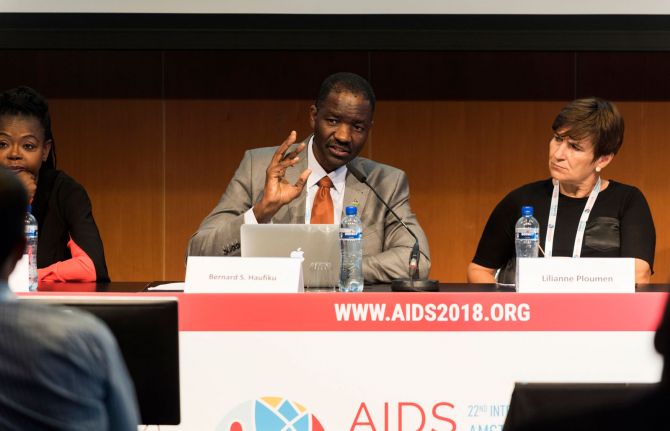
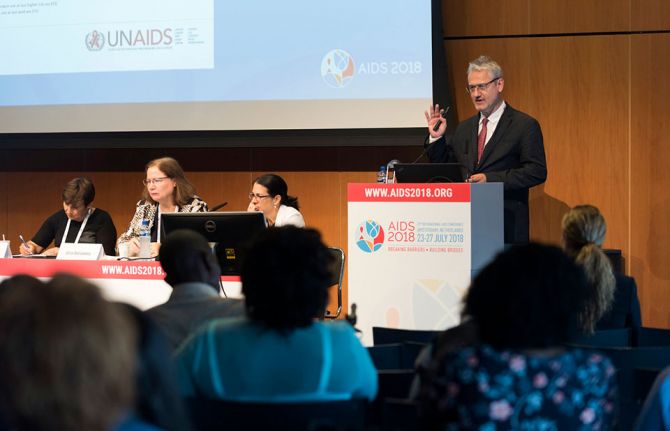

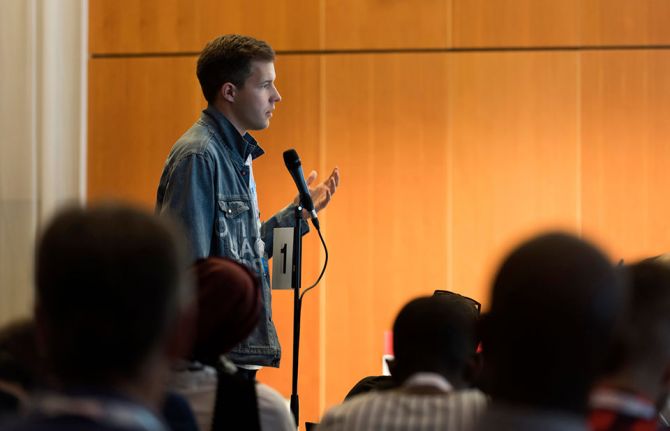
Update
A condom crisis at the centre of the HIV prevention crisis
28 July 2018
28 July 2018 28 July 2018HIV and other sexually transmitted infections and unintended pregnancies continue to pose a high health burden for millions of people, especially young women and key populations.
Data presented during a session of the 2018 International AIDS Conference, held in Amsterdam, Netherlands, from 23 to 27 July, entitled Condoms 2.0: Reinvigorating Effective Condom Programming in the Era of Epidemic Control, shows that condom promotion has averted an estimated 50 million new HIV infections since the onset of the HIV epidemic. Condom use at last higher-risk sex has increased over the past three decades in most countries across the world and is as high as 80–90% in some countries. Furthermore, in all countries for which data are available, a steady decrease in new adult HIV infections between 2000 and 2016 is associated with steady increases and high levels (more than 60%) of condom use by both men and women at last sex with a non-regular partner and condom use by men at last paid sex.
However, 30 years into the response to HIV and despite the increased use of condoms over the past three decades, condom availability and use gaps remain, in particular in sub-Saharan Africa, where the gap between availably and need is estimated to be more than 3 billion condoms. The estimated condom need in 47 countries in sub-Saharan Africa in 2015 was 6 billion male condoms; however, only an estimated 2.7 billion condoms were distributed.
The participants highlighted the many barriers and inequities hindering access to, and the use of, condoms that continue to exist, including poor access, age restrictions, gender norms, religious norms, stigma, insufficient supply and, in some places, laws that make it an offence to carry condoms. Many countries also prohibit condom promotion and distribution in schools and other venues where adolescents socialize. According to the participants, of the 100 countries that reported having a national plan or strategy related to condoms in 2017, only 26 reported that the plan included condom promotion in secondary schools.
International funding for condom procurement in sub-Saharan Africa has decreased in recent years, and domestic funding has not sufficiently increased, the participants noted. In several countries condom programming, in particular condom promotion and demand creation, has stalled due to a lack of funding and decreased investment.
During the session, the participants stressed the need for a new generation of comprehensive, data-driven and people-centred condom programmes as part of the delivery of combination HIV prevention and sexual and reproductive health services for people at higher risk of HIV and other sexually transmitted infections and unintended pregnancies.
These new programmes should aim at strengthening demand for and supply of condoms and lubricants and address the barriers and inequities that hinder the demand for and the provision, access and use of condoms by young people, key populations and other people at higher risk of HIV. Furthermore, condom promotion and distribution strategies and approaches need to be informed by data, tailored to the context and needs of different communities.
Lastly, the participants agreed on the need to set up effective multistakeholder condom programming coordination and oversight platforms and ensure the full involvement of beneficiaries and communities in planning, service delivery and monitoring.
Quotes
“There is a condom crisis at the centre of the prevention crisis. We are missing a cost-effective opportunity to maximize the contribution of condoms to reducing HIV infections, other sexually transmitted infections and unintended pregnancies.”
“We need to recapture lost ground. That means do business not as usual.”
“Not even for a million euros I would accept to do it with a client without a condom.”
Related resources
Related


Update
Ending AIDS is everyone’s business
17 July 2018
17 July 2018 17 July 2018Business leaders have met to explore how more and better action by business can be mobilized for the AIDS response, in alignment with the work of governments, civil society and donors.
In the opening remarks, Simon Bland, Director of the UNAIDS New York Liaison Office, highlighted the recognition by United Nations Member States of the importance of the private sector in helping to deliver on the Sustainable Development Goals (SDGs), but that this was sometimes narrowly focused on finance. We know that the private sector can bring much more to the table through their networks, management expertise, supply chains and innovations. There is a growing recognition of the need to move beyond philanthropy and corporate social responsibility to embedding SDG investments within core business operations.
Jane Nelson, Director of the Corporate Responsibility Initiative at Harvard Kennedy School, shared her insights on the role of companies in expanding economic opportunity and their ongoing journey in the past 20 years, moving from philanthropy to corporate social responsibility to integration into business functions, innovation, supply chain resilience, disclosure and governance.
The ensuing discussion with executives of three leading companies delved into the solutions to ending the AIDS epidemic as a public health threat by 2030 and how collaboration could generate additional impact across the work of their businesses, governments, civil society and donors.
The event, held on 16 July during the ministerial segment of the High-Level Political Forum on Sustainable Development, in New York, United States of America, was convened by UNAIDS.
Quotes
“The AIDS epidemic is far from over. If we want to end the AIDS epidemic as part of the Sustainable Development Goals, it is important to work ever more closely with the private sector in the search for systemic solutions that bring speed, scale and sustainability to the response and to do so safely with due diligence and protections for the most vulnerable so that no one is left behind.”
“At ViiV Healthcare, we not only offer a broad portfolio of antiretroviral medicines and an industry-leading pipeline of potential treatment and prevention options, but we are also focused on developing sustainable community programmes for people living with HIV.”
“In order to end HIV as public health problem by 2030, we need to find the most effective way to prevent new cases from occurring. This challenge becomes even more crucial now that some indicators suggest increased complacency. HIV activities could do with a boost; the private sector should make this clear to all other stakeholders.”
“Achieving the 90–90–90 goals for HIV testing, treatment and eradication requires the combined forces of industry, regulators, funders and public health entities across the globe. The ability for us all to now engage, educate and catalyse the public at large is paramount to delivering on critical testing programmes.”
“Companies that have a clear understanding of their Sustainable Development Goal impacts will ultimately be better placed to unlock market opportunities, consolidate an enduring licence to operate and manage operational and regulatory risks on the path to 2030. However, achieving the Sustainable Development Goals and harnessing the potential that they represent is a complex task which is ultimately beyond the reach of any one organization.”

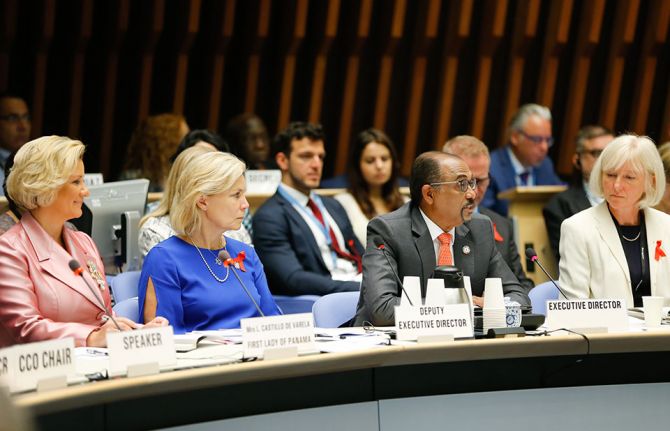
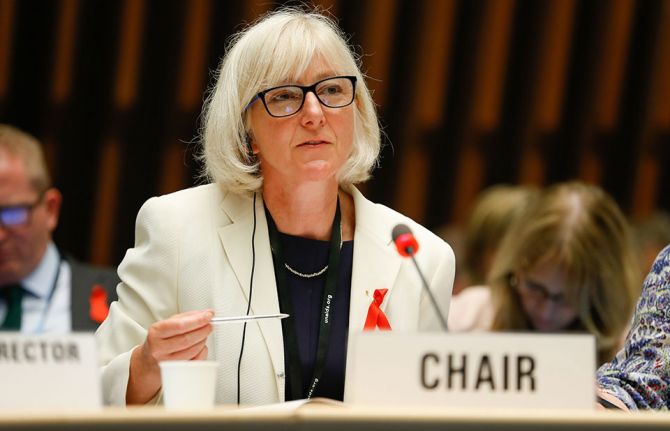
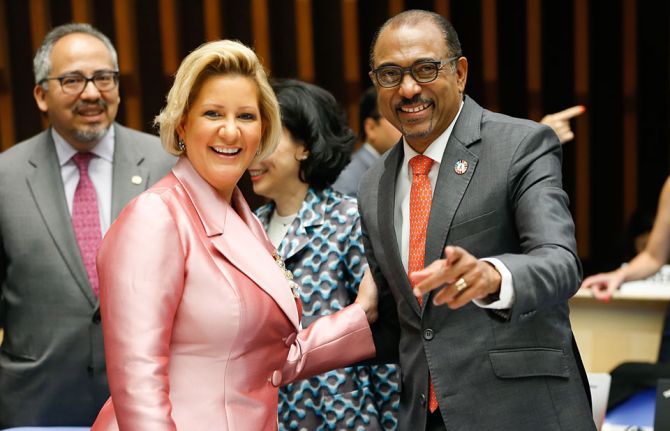
Update
UNAIDS Programme Coordinating Board opens
26 June 2018
26 June 2018 26 June 2018The 42nd meeting of the UNAIDS Programme Coordinating Board (PCB) is taking place in Geneva, Switzerland, from 26 to 28 June.
At the opening, the UNAIDS Executive Director, Michel Sidibé, gave an update on the progress made in the AIDS response and outlined the challenges and opportunities that lie ahead. He stressed that the progress made in the AIDS response is uneven and fragile and called for renewed focus and shared commitment to ending the AIDS epidemic by 2030.
Mr Sidibé also emphasized the need for a transformative approach to the epidemic that will include reforming laws and policies to end discrimination, expand community-led, people-centred approaches to HIV service delivery, the use of timely location–population data to inform decision-making, close the funding gap to achieve the Fast-Track Targets and reinforce the linkages between ending AIDS and achieving universal health coverage.
PCB members were also informed about the proactive actions taken to stamp out sexual harassment, unethical workplace behaviour and all forms of abuse at UNAIDS. These actions include establishing an internal five-point plan to ensure that actions are taken rapidly and effectively against inappropriate behaviour and abuse of authority, but also engaging with external stakeholders, including civil society, to gather valuable inputs on how to strengthen UNAIDS’ work in this area.
Later in the day, the PCB received an update on the process of the establishment of the Independent Expert Panel on prevention of and response to harassment, including sexual harassment, bullying and abuse of power at the UNAIDS Secretariat.
The thematic segment of the meeting will take place on the last day and will focus on ending tuberculosis (TB) and AIDS. The participants will consider the challenges to addressing TB, HIV-associated TB and drug-resistant TB in the context of universal health coverage and the Sustainable Development Goals. The participants will also discuss examples of good practice that demonstrate effective collaboration within national TB and HIV programmes and with communities to achieve integrated TB/HIV care and strengthen health systems.
The 42nd meeting of the PCB is being chaired by the United Kingdom of Great Britain and Northern Ireland, with China acting as Vice-Chair and Algeria as Rapporteur.
Related links


Update
China Global Television Network interviews UNAIDS Executive Director about the AIDS response
27 June 2018
27 June 2018 27 June 2018During his recent visit to China, UNAIDS Executive Director Michel Sidibé provided an overview of the response to AIDS and the challenges ahead to meet the goal of ending AIDS by 2030 during an interview with Tian Wei from the China Global Television Network (CGTN).
According to Mr Sidibé, ending HIV transmission as well as AIDS-related discrimination will be key to achieve the ambitious targets set as part of the Sustainable Development Goals.













